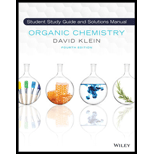
ORGANIC CHEMISTRY-WILEYPLUS NEXTGEN
4th Edition
ISBN: 9781119760924
Author: Klein
Publisher: WILEY
expand_more
expand_more
format_list_bulleted
Question
Chapter 25.3, Problem 20CC
Interpretation Introduction
Interpretation:
For synthesis of glycine it is inappropriate to use chiral catalyst has to be explained.
Concept introduction:
Asymmetric catalytic hydrogenation is a reaction in which the
The final step after hydrogenation is the hydrolysis of the protected group of

To explain: why use of chiral catalyst is inappropriate for the synthesis of glycine.
Expert Solution & Answer
Want to see the full answer?
Check out a sample textbook solution
Chapter 25 Solutions
ORGANIC CHEMISTRY-WILEYPLUS NEXTGEN
Ch. 25.2 - Prob. 1CCCh. 25.2 - Prob. 2CCCh. 25.2 - Prob. 3CCCh. 25.2 - Prob. 1LTSCh. 25.2 - Prob. 4PTSCh. 25.2 - Prob. 7CCCh. 25.2 - Prob. 8CCCh. 25.2 - Prob. 9CCCh. 25.2 - Prob. 10CCCh. 25.2 - Prob. 11CC
Ch. 25.3 - Prob. 12CCCh. 25.3 - Prob. 13CCCh. 25.3 - Prob. 2LTSCh. 25.3 - Prob. 14PTSCh. 25.3 - Prob. 17CCCh. 25.3 - Prob. 18CCCh. 25.3 - Prob. 19CCCh. 25.3 - Prob. 20CCCh. 25.4 - Prob. 3LTSCh. 25.4 - Prob. 21PTSCh. 25.4 - Prob. 25CCCh. 25.4 - Prob. 26CCCh. 25.4 - Prob. 27CCCh. 25.4 - Prob. 28CCCh. 25.4 - Prob. 29CCCh. 25.5 - Prob. 30CCCh. 25.5 - Prob. 4LTSCh. 25.5 - Prob. 31PTSCh. 25.6 - Prob. 5LTSCh. 25.6 - Prob. 34PTSCh. 25 - Prob. 40PPCh. 25 - Prob. 41PPCh. 25 - Prob. 42PPCh. 25 - Prob. 43PPCh. 25 - Prob. 44PPCh. 25 - Prob. 45PPCh. 25 - Prob. 46PPCh. 25 - Prob. 47PPCh. 25 - Prob. 48PPCh. 25 - Prob. 49PPCh. 25 - Prob. 50PPCh. 25 - Prob. 51PPCh. 25 - Prob. 52PPCh. 25 - Prob. 53PPCh. 25 - Prob. 54PPCh. 25 - Prob. 55PPCh. 25 - Prob. 56PPCh. 25 - Prob. 57PPCh. 25 - Prob. 58PPCh. 25 - Prob. 59PPCh. 25 - Prob. 60PPCh. 25 - Prob. 61PPCh. 25 - Prob. 62PPCh. 25 - Prob. 63PPCh. 25 - Prob. 64PPCh. 25 - Prob. 65PPCh. 25 - Prob. 66PPCh. 25 - Prob. 67PPCh. 25 - Prob. 68PPCh. 25 - Prob. 69PPCh. 25 - Prob. 70PPCh. 25 - Prob. 71PPCh. 25 - Prob. 72PPCh. 25 - Prob. 73PPCh. 25 - Prob. 74PPCh. 25 - Prob. 75PPCh. 25 - Prob. 76PPCh. 25 - Prob. 77PPCh. 25 - Prob. 78PPCh. 25 - Prob. 79PPCh. 25 - Prob. 80PPCh. 25 - Prob. 81PPCh. 25 - Prob. 82PPCh. 25 - Prob. 83PPCh. 25 - Prob. 89IPCh. 25 - Prob. 90IPCh. 25 - Prob. 91IPCh. 25 - Prob. 92IP
Knowledge Booster
Recommended textbooks for you
 ChemistryChemistryISBN:9781305957404Author:Steven S. Zumdahl, Susan A. Zumdahl, Donald J. DeCostePublisher:Cengage Learning
ChemistryChemistryISBN:9781305957404Author:Steven S. Zumdahl, Susan A. Zumdahl, Donald J. DeCostePublisher:Cengage Learning ChemistryChemistryISBN:9781259911156Author:Raymond Chang Dr., Jason Overby ProfessorPublisher:McGraw-Hill Education
ChemistryChemistryISBN:9781259911156Author:Raymond Chang Dr., Jason Overby ProfessorPublisher:McGraw-Hill Education Principles of Instrumental AnalysisChemistryISBN:9781305577213Author:Douglas A. Skoog, F. James Holler, Stanley R. CrouchPublisher:Cengage Learning
Principles of Instrumental AnalysisChemistryISBN:9781305577213Author:Douglas A. Skoog, F. James Holler, Stanley R. CrouchPublisher:Cengage Learning Organic ChemistryChemistryISBN:9780078021558Author:Janice Gorzynski Smith Dr.Publisher:McGraw-Hill Education
Organic ChemistryChemistryISBN:9780078021558Author:Janice Gorzynski Smith Dr.Publisher:McGraw-Hill Education Chemistry: Principles and ReactionsChemistryISBN:9781305079373Author:William L. Masterton, Cecile N. HurleyPublisher:Cengage Learning
Chemistry: Principles and ReactionsChemistryISBN:9781305079373Author:William L. Masterton, Cecile N. HurleyPublisher:Cengage Learning Elementary Principles of Chemical Processes, Bind...ChemistryISBN:9781118431221Author:Richard M. Felder, Ronald W. Rousseau, Lisa G. BullardPublisher:WILEY
Elementary Principles of Chemical Processes, Bind...ChemistryISBN:9781118431221Author:Richard M. Felder, Ronald W. Rousseau, Lisa G. BullardPublisher:WILEY

Chemistry
Chemistry
ISBN:9781305957404
Author:Steven S. Zumdahl, Susan A. Zumdahl, Donald J. DeCoste
Publisher:Cengage Learning

Chemistry
Chemistry
ISBN:9781259911156
Author:Raymond Chang Dr., Jason Overby Professor
Publisher:McGraw-Hill Education

Principles of Instrumental Analysis
Chemistry
ISBN:9781305577213
Author:Douglas A. Skoog, F. James Holler, Stanley R. Crouch
Publisher:Cengage Learning

Organic Chemistry
Chemistry
ISBN:9780078021558
Author:Janice Gorzynski Smith Dr.
Publisher:McGraw-Hill Education

Chemistry: Principles and Reactions
Chemistry
ISBN:9781305079373
Author:William L. Masterton, Cecile N. Hurley
Publisher:Cengage Learning

Elementary Principles of Chemical Processes, Bind...
Chemistry
ISBN:9781118431221
Author:Richard M. Felder, Ronald W. Rousseau, Lisa G. Bullard
Publisher:WILEY